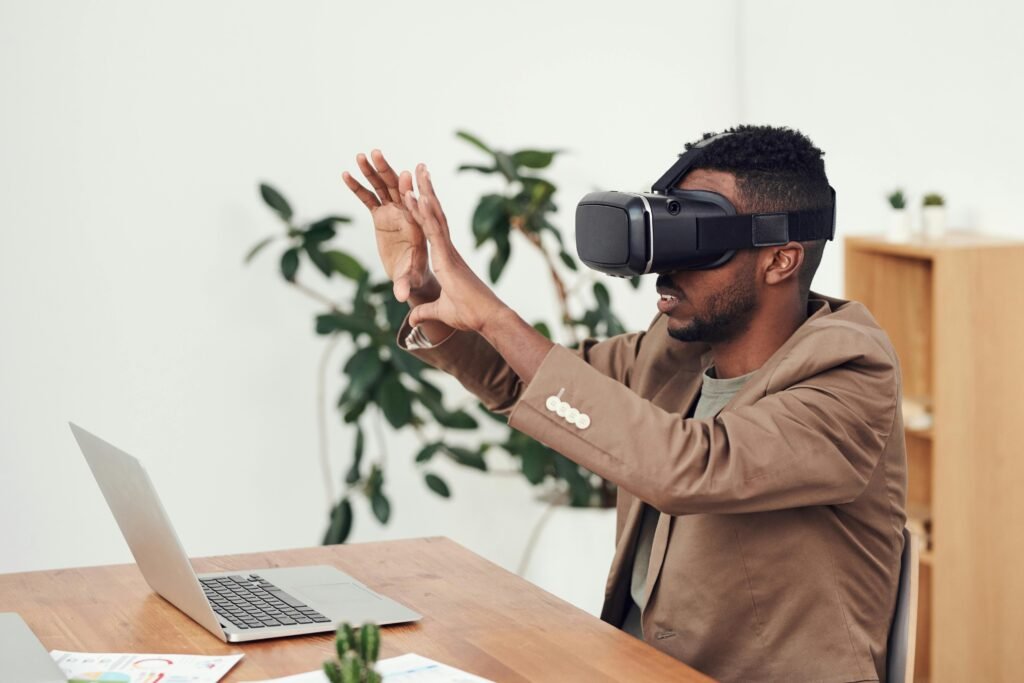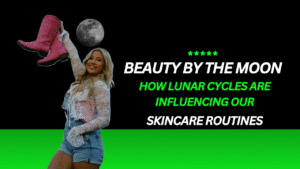This post may contain affiliate links. I may receive compensation if you sign up for or purchase any products through the links below. As an Amazon Associate and affiliate marketer for many other businesses, I earn from qualifying purchases. Please read my disclosure for more information.
The beauty industry has undergone significant transformations over the years, but none quite as profound as the current shift driven by artificial intelligence (AI), and the future of beauty. As beauty remains inherently personal, the advent of AI technologies is revolutionizing how consumers approach skincare and cosmetics. This technological evolution is not merely about innovation for the sake of novelty; it reflects a deeper understanding of individual needs and preferences in beauty routines. By leveraging data-driven insights, AI facilitates the creation of tailored beauty experiences, thereby extracting the essence of personalization which was often absent in conventional practices.
At the heart of this AI revolution lies a commitment to understanding the unique characteristics of each customer. Traditional methods often relied on one-size-fits-all solutions with limited scope for customization. However, AI technologies, through advanced algorithms and machine learning, are capable of analyzing vast amounts of data to offer bespoke recommendations. Whether it’s analyzing skin types, tracking cosmetic preferences, or even recognizing trends based on user behavior, AI allows beauty brands to engage consumers in a more meaningful way, enhancing their overall experience.
Moreover, the integration of AI in beauty is not just limited to product personalization; it extends to customer service, marketing strategies, and product development. By utilizing AI chatbots and virtual consultants, brands can provide on-demand expert advice and product suggestions tailored to individual skincare needs. Additionally, this intelligent tech assists companies in predicting market trends, ultimately leading to a more agile and responsive beauty sector. As we delve deeper into this blog, we will explore the various facets of AI’s influence on the beauty landscape, highlighting its potential to significantly enrich customer outcomes across the board.
Understanding Personalization in Skincare
Personalized skincare has emerged as a critical aspect of the beauty industry, substantially shifting the paradigm from generic solutions to tailored products that meet individual needs. This significant transition recognizes the uniqueness of each individual’s skin, which is influenced by a variety of factors such as skin type, specific concerns, and environmental conditions. For instance, individuals with oily skin may struggle with acne and require different ingredients compared to those with dry or sensitive skin. Understanding these unique traits is essential for the formulation of effective skincare regimens.
The traditional one-size-fits-all approach often overlooks these nuanced differences, leading to ineffective treatments and consumer frustration. As the beauty sector evolves, there is an increasing demand for products that cater specifically to individual needs. Advanced technologies, particularly artificial intelligence (AI), are revolutionizing the way consumers access skincare recommendations. AI can analyze a wealth of data points, including skin type, environmental exposure, dietary habits, and specific concerns like hyperpigmentation or signs of aging. This comprehensive analysis allows for the creation of highly individualized skincare regimens.
Moreover, the role of AI in skincare extends beyond initial assessments. By continuously monitoring the skin’s response to various products and environmental changes, AI can adapt and optimize routines over time. This dynamic personalization ensures that individuals receive the most effective treatments for their skin, significantly enhancing user satisfaction. As consumers increasingly seek out personalized skincare solutions, the integration of AI will likely play a pivotal role in shaping the future of beauty. It offers a promising avenue for addressing the diverse requirements of consumers and fostering a deeper connection between individuals and their skincare routines.
How AI Analyzes Skin Data
Artificial intelligence (AI) technologies have revolutionized the way skincare and cosmetic products are recommended to consumers. The process begins with the collection of skin data, employing various advanced techniques that assess individual skin conditions. One of the primary methods utilized is facial recognition technology. This involves high-resolution imaging systems that capture detailed images of the skin, enabling algorithms to identify specific features such as texture, pigmentation, and any existing blemishes or conditions.
Another important technique is skin mapping, where AI algorithms analyze the acquired images to create a detailed map of the skin’s surface. This mapping highlights different zones with varying characteristics, such as oiliness, dryness, or sensitivity levels. By assessing the unique attributes of each area, AI tools can provide a comprehensive overview of the skin’s health. Furthermore, the integration of diagnostics apps allows users to engage interactively with their skincare assessments. Users can take photos of their skin, typically using their smartphones, and submit this data to AI platforms for analysis.
These applications often incorporate machine learning, which enables them to improve their recommendations over time based on user feedback and outcomes. As more individuals use these applications, the data collected fuels the algorithms, leading to increasingly personalized skincare solutions. The amalgamation of these technologies has profound implications for the beauty industry, as they enable brands to offer products tailored to the specific needs of consumers.
In essence, the transformative impact of AI in analyzing skin data not only enhances the accuracy of skincare assessments but also fosters a more tailored approach to product recommendations, thereby reshaping how consumers engage with their beauty routines.
The Role of Machine Learning in Formulating Products
In the evolving landscape of beauty and skincare, machine learning (ML) plays a pivotal role in the formulation of products. By harnessing vast amounts of data, algorithms can analyze the effectiveness of various ingredients to ascertain their suitability for individual skin types and conditions. This approach leads to a more personalized skincare experience, an essential aspect of modern beauty regimens. Through machine learning, brands can develop products that not only cater to specific skin concerns but also enhance overall effectiveness.
Traditionally, formulating skincare and cosmetic products involved extensive research and trial-and-error methods, often taking a considerable amount of time to yield accurate results. However, the integration of machine learning streamlines this process significantly. By utilizing predictive analytics, algorithms can assess numerous variables, including ingredient combinations and their respective interactions with skin physiology. This capability allows researchers to identify promising formulations more quickly, leading to faster product innovation.
For example, machine learning algorithms can predict how ingredients like hyaluronic acid or retinol interact with various skin types, such as oily, dry, or sensitive skin. By analyzing historical data from skincare studies and user feedback, these systems learn which combinations yield the best results. This meticulous analysis reduces the likelihood of adverse skin reactions and increases consumer trust in new products.
Moreover, machine learning fosters continuous improvement. As brands collect more data from skin assessments and customer experiences, these algorithms refine their suggestions, ensuring that formulations evolve in tandem with emerging skincare science. In a sector where consumer preferences change rapidly, the ability to adapt formulations efficiently positions brands favorably within the market. Consequently, the role of machine learning in developing skincare formulations marks a significant advancement toward personalized beauty solutions, making both efficacy and safety paramount considerations in product development.
AI in Cosmetic Customization: Beyond Skin Deep
Artificial Intelligence (AI) has transformed various sectors, and the beauty industry is no exception. One of the most significant advancements lies in customization, particularly through the creation of personalized cosmetic products. Brands are increasingly leveraging AI algorithms to analyze user preferences and skin types, providing tailored solutions that cater to individual needs. This innovative approach not only enhances user engagement but also elevates overall satisfaction with beauty products.
Through sophisticated machine learning models, companies can collect and process data more efficiently than ever before. This data includes user feedback, skin tone measurements, and even the specific needs of an individual’s skin. By utilizing AI-driven technology, brands can now offer bespoke formulations that allow consumers to modify makeup shades and finishes, ensuring they receive products that align with their unique beauty requirements. For instance, a user can easily adjust the tone and texture of a foundation based on seasonal changes or personal style preferences.
The option for customization extends beyond basic color adjustments. For instance, advanced AI tools can suggest complementary products that enhance the beauty experience, thereby allowing for complex looks that resonate with individual styles. This creates immense value not only in terms of consumer satisfaction but also in building brand loyalty. When customers feel that their personal preferences are accounted for, they are more likely to engage with the brand and advocate for it within their social circles.
Furthermore, AI enables the beauty industry to rapidly adapt to emerging trends. As consumer tastes evolve, AI algorithms can track these changes in real time, promoting dynamic customization options that keep brands relevant and responsive. Ultimately, AI’s role in cosmetic customization signifies a profound shift towards a more personalized beauty experience, transforming how consumers approach their skincare and cosmetic needs.

Virtual Try-Ons and Augmented Reality
In recent years, the integration of augmented reality (AR) and artificial intelligence (AI) has revolutionized the way consumers approach skincare and cosmetics. Virtual try-ons powered by these technologies allow users to visualize how various products will look on their skin without physically applying them. By using a smartphone or a computer, consumers can engage with a digital interface that superimposes makeup onto their real-time image, enabling them to experiment with different shades and styles.
The innovative combination of AR and AI enhances the personalization of product recommendations, catering to individual skin tones, features, and personal preferences. AI algorithms analyze user input, suggesting cosmetics that not only enhance facial features but also align with style preferences. This tailored approach fosters a deeper connection between the consumer and the product, encouraging confidence in purchase decisions. Unlike traditional shopping methods, where consumers must rely on product descriptions and static images, virtual try-ons provide an interactive experience that approximates reality, significantly improving the decision-making process.
One of the pivotal advantages of virtual try-ons is their ability to reduce product returns, which has been a persistent challenge in the beauty industry. By allowing users to see how a product looks on them before committing to a purchase, the likelihood of dissatisfaction is markedly decreased. This not only benefits consumers but also helps brands minimize costs associated with returns and unsold inventory, ultimately promoting sustainable practices in the cosmetics industry.
Especially in an era where online shopping has become ubiquitous, the implementation of AR and AI in beauty products is transforming the shopping landscape. As these technologies continue to evolve, we can expect even more innovative solutions that will enhance the consumer experience through seamless and personalized interactions. The future of beauty certainly appears to be aligned with the advancements in virtual try-on capabilities, paving the way for a more engaging and efficient shopping experience.
Ethical Considerations and Consumer Trust
The integration of artificial intelligence (AI) in the beauty industry presents significant ethical considerations that must be addressed to maintain consumer trust. As beauty brands increasingly rely on AI technologies to personalize skincare products and cosmetics, the issue of data privacy has emerged as a critical concern. Consumers often provide sensitive personal information when engaging with AI-driven platforms, and it is essential for companies to handle this data responsibly. This includes transparent practices regarding what data is collected, how it is used, and with whom it is shared.
To foster consumer trust, beauty brands need to prioritize ethical standards in their AI applications. Transparency is a vital component; companies must openly communicate their data practices and the rationale behind the AI recommendations they provide. By doing so, they demonstrate a commitment to ethical practices and consumer empowerment. Providing users with options to control their data—such as opting out of data collection or easily deleting their information—can further enhance trust and foster a positive relationship with consumers.
Additionally, beauty brands should engage in ongoing discussions about the implications of AI in their operations. Establishing guidelines and ethical frameworks governing AI usage can serve as a foundational aspect of corporate responsibility. Such frameworks should not only address data privacy but also ensure that the technology is inclusive, avoiding biases that could lead to dehumanizing beauty standards or exclusion of certain demographics.
As the beauty industry navigates this transformative era, it is imperative that brands build a trustworthy environment around their AI technologies. By prioritizing ethical considerations and consumer trust, companies can create an industry standard that encourages not only innovation but also customer loyalty and satisfaction.
Case Studies: Brands Leading the Charge
Artificial Intelligence (AI) is profoundly transforming the landscape of the beauty industry, as numerous brands are beginning to leverage this technology to enhance consumer experiences and product offerings. One notable example is L’Oreal, which has integrated AI into its customer service through personalized skincare consultations. By utilizing a mobile app, L’Oreal’s AI technology analyzes consumers’ individual skin types and concerns, providing tailored product recommendations. This approach not only increases consumer engagement but also fosters brand loyalty, as customers feel more valued with personalized attention.
Another exemplary brand is Estée Lauder, which has embraced AI-driven tools to streamline its product development process. The company utilizes machine learning algorithms to predict beauty trends and consumer preferences, allowing it to innovate effectively and remain relevant in a rapidly changing market. Furthermore, Estée Lauder has introduced AI-powered virtual try-on applications, enabling users to visualize how cosmetics will look on their skin before making a purchase. This not only enhances user experience but also reduces the likelihood of returns, ultimately benefiting both the brand and the consumer.
Proactiv, known for its acne treatment products, has also adopted AI technology by offering an app that assesses users’ skin conditions through photo analyses. The app employs AI to suggest customized skincare regimens, enhancing customer satisfaction by ensuring a more effective treatment schedule. As a result, Proactiv has seen increased adherence to its skincare routines, leading to higher rates of consumer retention and positive reviews.
Through these case studies, it is evident that brands like L’Oreal, Estée Lauder, and Proactiv are not merely adopting AI but are at the forefront of a transformative movement in the beauty industry. Their innovative strategies underscore the potential of AI in personalizing skincare and cosmetics to meet individual consumer needs, thereby reinforcing brand loyalty and increasing overall consumer satisfaction.
The Future: What Lies Ahead for AI in Beauty
The beauty industry stands on the cusp of a technological revolution, with artificial intelligence (AI) poised to further personalize skincare and cosmetics in unprecedented ways. As AI technology advances, we anticipate a myriad of emerging trends that could reshape both consumer experiences and industry practices. One notable trend is the expansion of AI-driven skin analysis tools, which can provide consumers with tailored recommendations based on individual skin types and conditions. These tools leverage sophisticated algorithms and vast databases, ensuring recommendations are not only effective but also adapt over time to changes in skin condition and environmental factors.
Moreover, we foresee the integration of AI with augmented reality (AR) to enhance user experiences. Virtual try-on applications are growing in popularity, allowing consumers to visualize how different products look on their skin before making a purchase. This fusion of AI and AR could potentially reduce product returns and increase consumer satisfaction by enabling more informed decisions. Additionally, the rise of AI influencers, powered by machine learning, could be instrumental in shaping brand narratives and consumer engagement, fundamentally altering marketing dynamics within the beauty sector.
However, the ongoing evolution of AI in beauty does not come without challenges. Issues related to data privacy and ethical considerations surrounding the use of personal information must be addressed to build consumer trust. Furthermore, as AI technology becomes increasingly ubiquitous, the beauty industry must also contend with potential saturation, where distinguishing differentiators may diminish over time. Yet, this same landscape presents opportunities for innovation and collaboration between tech developers and beauty brands, potentially leading to groundbreaking products and services that align more closely with consumer desires.
In conclusion, the future of AI in cosmetics and skincare is bright, filled with promise and potential. By proactively navigating the challenges while embracing the opportunities that AI presents, the beauty industry can continue to thrive and redefine consumer engagement. As we look forward, it is evident that AI will remain at the forefront, creating a more personalized and responsive beauty experience for consumers globally.









